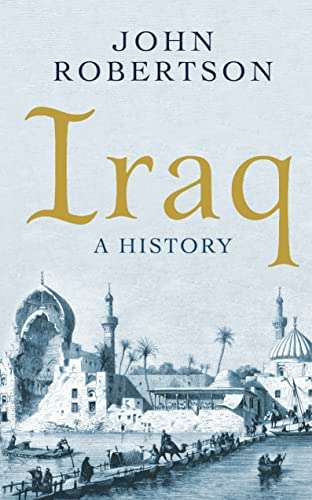
Iraq: A History
Check my rate
| Main centres: | 1-3 business days |
| Regional areas: | 3-4 business days |
| Remote areas: | 3-5 business days |

| Main centres: | 1-3 business days |
| Regional areas: | 3-4 business days |
| Remote areas: | 3-5 business days |
Published by Oneworld Publications, 2016, softcover, illustrated, 386 pages, condition; as new.
Cities, scripts, literature, the rule of law all were born in Iraq. That so many see this ancient land as nothing more than a violent backwater steeped in chaos is a travesty. This is the place where, for the first 5,000 years of human history, all innovations of worth emerged. It was the cradle of civilization.
In this unrivalled study, John Robertson details the greatness and grandeur of Iraqs achievements, the brutality and magnificence of its ancient empires and its extraordinary contributions to the world. The only work in the English language to explore the history of the land of two rivers in its entirety, it takes readers from the seminal advances of its Neolithic inhabitants to the aftermath of the American and British-led invasion, the rise of Islamic State and Iraq today. A fascinating and thought-provoking analysis, it is sure to be greatly appreciated by historians, students and all those with an interest in this diverse and enigmatic country.
This edition features a new epilogue, bringing the work up to date and looking ahead to Iraqs future."
Iraq: A History by John Robertson is an interesting look at the history of the modern nation-state of Iraq, and the people that resided and conquered its geographic dimensions throughout history. The country of Iraq is a relatively modern phenomena, with the entire region, in antiquity (and into modern times) known as Mesopotamia. This region played the role both as the seat of empires such as the Sumerians, Assyrians and Babylonians, as well as regions of others, such as the Persian, Greek or Ottoman Empires. Baghdad, the capital city, was the centre of the Abbasid Caliphate, and home to some of humanities great scientific and cultural achievements. In recent times, Iraq has been a colony, exploited for its oil wealth. A Hashemite kingdom was set up under the tutelage of Great Britain. Imperial dominance was sidetracked by a period of Iraqi autonomy, which culminated in the rise of brutal dictator Saddam Hussein, and ended violently with a US invasion and the subsequent collapse of Iraqi society we are experiencing today, with fragmentations along religious and ethnic lines dividing the country as civil insurgency and war threatens to tear the country apart.
Robertson's account of Iraq is concise, and brief, somewhat to a fault. The vast amounts of history covered, as Iraq was one of the cradles of human civilization, is mind boggling, and each period of history could be given entire tomes of information. Even so, the brief accounts of Ottoman and Persian dominance (a couple of pages each) leaves a lot to be desired. That aside, Robertson's Iraq does a good job giving the highlights of Iraqi history, covering characters like Hammurabi, King Faisal and Saddam, to name just a couple. The religio-ethnic changes through Iraq's history is also fascinating, as we learn about the Mesopotamian pantheons that each city-state kept, to the birth and spread of Judaism, Zoroastrianism, Christianity and Islam, with the very close similarities between these religions given in brief. The Islamic period obviously played a central role in modern Iraq's makeup, with the division of the religion between Sunni and Shia covered (and indeed many of the battles fought) within Iraq and the region as a whole. The migration of Arab tribesman from Arabia to Iraq is noted, and even speculated as starting before the rise of Islam itself. The growth and fall of great cities like Ur, Babylon and so on are fascinating as well. Iraq's history as the regions breadbasket and central trading route are covered, and so on. Robertson has written a highly readable, if brief, account of Iraqi history, and has highlighted each of the major events and characters that has shaped the countries history since the beginning of human civilization. Although Iraq itself is a fairly new construct, the country has played a central role throughout human history, and especially as current events rage in the nation, it is important for Western readers to ground their knowledge of Iraq in historical realities, and not whimsical and naïve political notions. Iraq has always been a land of change. It has risen and fallen, and risen and fallen again and again. It is important for us to realize this significance and ensure that our knowledge of Iraq is not dogged in petty and trivial political rhetoric. Highly recommended, especially to Western readers."